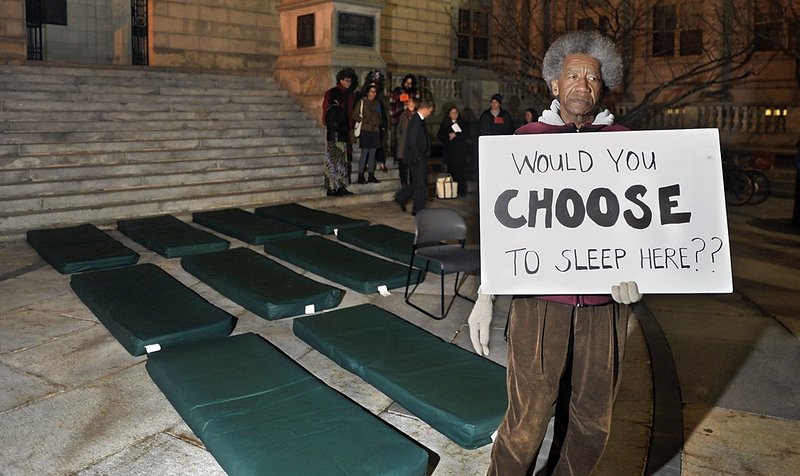Brian Barbour, 53, is the latest casualty. The homeless man died Saturday, probably of smoke inhalation after a lit candle set fire to his tent. He is one of dozens of homeless people who have died in Portland in the last few years.
This sad report on the unforgiving life on the street makes a somber backdrop for Tuesday night’s meeting of the City Council’s Public Safety Committee, which has been charged with implementing the recommendations of the city’s Homelessness Prevention Task Force.
When it was set up early last year, the task force seemed like a forward-looking attempt to get to the root of a serious problem. While that’s still the case, it’s also true that the problem has gotten even worse as the task force has been completing its work.
The city’s Oxford Street homeless shelter is full every night and has been for a year.
Up to 75 people can sleep on the floor of the Preble Street soup kitchen. That, too, fills up frequently, so a number of people pass the night sleeping in chairs in a “warming shelter” on Lancaster Street.
Is it any wonder that some, like Barbour, choose to camp out?
But you don’t need to do a census of the shelters to know that there is a growing population of homeless people. You can see them in the parks, the library, public places and standing alongside the busiest intersections around the city, holding signs asking for help.
The problem is not panhandling, public drunkenness or antisocial behavior — those are the symptoms. The problem is not overly generous benefits, either — as if spending a night balancing on a chair or freezing in a tent could be seen as overly generous.
The problem is poverty and our inability to get people back on their feet when they become overwhelmed. There’s not a single solution. In many cases, people need more than food and shelter. But the state cutbacks on services for people with mental illness and substance abuse problems have made the holes in the safety net that much bigger.
And if the strain on public services seems too much now, keep in mind that it’s likely to get worse. The homeless population tends to peak in the summer, not the winter.
So, yes, the council is right to take a long-range approach to address the roots of homelessness and provide a range of housing options from adequate emergency shelters to permanent housing placements.
But that’s too late for Brian Barbour and the other homeless people who have died on our streets.
This is a crisis right now, and the City Council should keep a sense of urgency as it makes plans to address it.
Send questions/comments to the editors.



Success. Please wait for the page to reload. If the page does not reload within 5 seconds, please refresh the page.
Enter your email and password to access comments.
Hi, to comment on stories you must . This profile is in addition to your subscription and website login.
Already have a commenting profile? .
Invalid username/password.
Please check your email to confirm and complete your registration.
Only subscribers are eligible to post comments. Please subscribe or login first for digital access. Here’s why.
Use the form below to reset your password. When you've submitted your account email, we will send an email with a reset code.